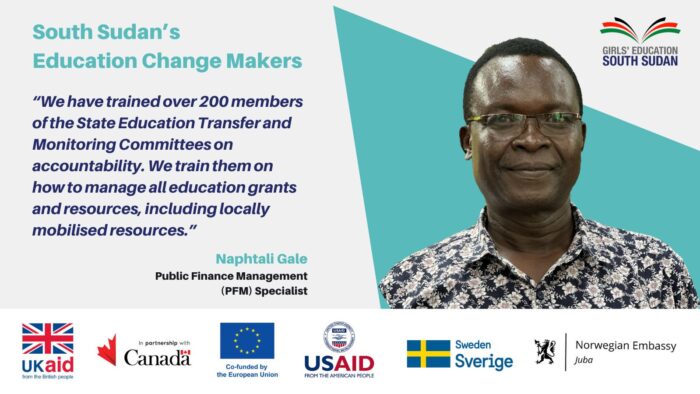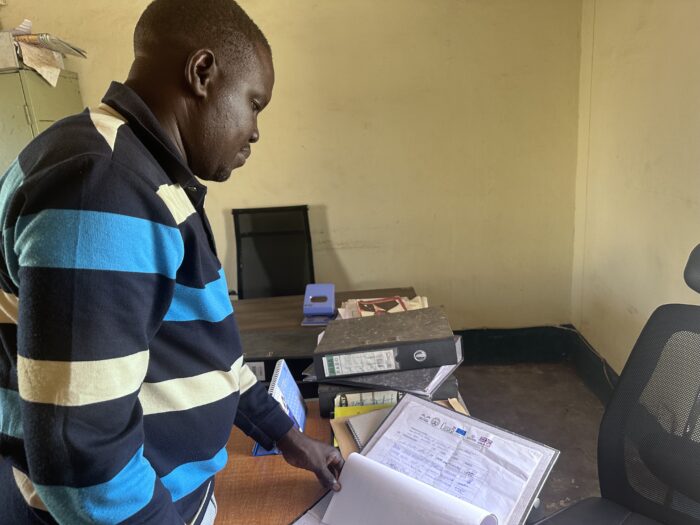Strong public financial management means improved schools for our children!
December 21, 2023 2:52 pmGESS is working in the space of Public Financial Management (PFM), but what is Public Financial Management?
Public Financial Management refers to the process of managing public funds and resources for effective service delivery. In the context of GESS school capitation grants, for example, Public Financial Management is the process of ensuring that these grants are utilized efficiently to achieve the goal of free education for all learners.
GESS is providing capacity building for relevant education stakeholders such as Director Generals for Planning, Labour and Public Service, Administrators, School Managers, amongst others to improve their ability to manage education funds and resources. Together with the national Ministry of General Education and Instruction, (MoGEI), GESS supports State Ministries of Education to set up State Education Transfer and Monitoring Committees to improve their management of public funds. The State Education Transfer and Monitoring Committees operate in ten states and the three administrative areas of South Sudan.
“To date, we have trained over 200 members of the State Education Transfer and Monitoring Committees (SETMCs) on accountability across the country. We don’t train them to only manage and account for grants from Girls’ Education South Sudan (GESS), but all education grants and resources, including locally mobilised resources,” Naphtali, GESS’ Public Finance Management (PFM) Specialist.

This is an important step to protect South Sudan’s, and donor countries’, taxpayers’ money and to ensure that it is going toward the intended purpose of strengthening public services.
“Before the State Education Transfer and Monitoring Committee was set, there was no systematic reporting system at the (state) Ministry in Northern Bhar el Ghazal in terms of accountability and how to report on finances. When the payment was done, there were no reports to account for the expenditure, but now through the Committee, our Director General and the Director for Admin and Finance, we are making reports monthly on how education grants are spent. This shows transparency and improves service delivery,” Peter Deng, Director of Planning and Budgeting, SMoE.
Mr Deng sits in the State Ministry in Northern Bhar el Ghazal state, leading the planning and budgeting directorate. It is an office with piles of files on the tables and large cupboards full to the brim with documents. Since Mr Deng joined the State Ministry, he hasn’t seen anything close to the capacity building on Public Financial Management, and he’s grateful for the establishment of the State Education Transfer and Monitoring Committees.

Director General at the State Ministry of Education in Northern Bhar el Ghazal in his office
“I have been here for a long time, but I have never seen things being done as transparently. I believe it was due to lack of capacity amongst the responsible people, but also no clear set systems for things to run. Now with the State Education Transfer and Monitoring Committees, the trainings we received from the national Ministry and GESS, everybody seems to know what they are supposed to do, and there will be clear accountability for funds because everybody (within the Ministry) knows the funds coming to the state,” Deng states.
Chaired by the Director General at the State Ministry, the State Education Transfer and Monitoring Committees comprises of 17 members. These members include stakeholders from MoGEI, and other line ministries. The members include the Director Generals for Planning, Labour and Public Service, the State Ministry of Finance, GESS State Anchor Team Leaders and education partners etc. The State Education Transfer and Monitoring Committees aim to steer the State Ministries in the direction of proper financial management.
GESS supports the State Education Transfer and Monitoring Committees with training on a number of topics that improve their operation. The areas covered include:
- Accountability and transparency
- Resource mobilisation and management
- Financial reporting and report writing
- Ledger bookkeeping
- Budgeting priorities
The State Education Transfer and Monitoring Committees convene monthly to deliberate on education issues at the state level and come up with context-specific solutions. “Members have the opportunity to discuss how challenges can be addressed in terms of financial utilisation in education from the state, down to the counties and even the school. We have seen some improvement in terms of utilisation and accountability of funds in the schools, counties and Payams,” Deng.
Through the State Education Transfer and Monitoring Committees, GESS foresees an organised education system where there is accountability and transparency in managing funds, but above all, for the State Ministries of Education to be able to understand how government budgets work and effectively budget for education in their states and utilise them constructively.
“You see, the end goal is to see that there is a clear system set where funds are accounted for. Say one of the States receives over 30 million block grants to support education, but stakeholders are not well equipped to manage such funds, monies will be given to the states, and nobody will account for them, which is dangerous. The State Education Transfer and Monitoring Committees ensure such funds are managed effectively,” Naphtali adds.
“Before the inception of the State Education Transfer and Monitoring Committees, we (at the State Ministry of Education) did not know the education budget clearly. Through the establishment of the Committees, and training, now we know the budget for education, we know the budget for the year 2021/2022, and we are in the process to get the details for the budget for 2023/2024. We’ll know how much is for (teacher) salaries, Ministry operations, and GESS capitation grants. Previously it was very difficult for us to have access to this information, but now we clearly know the resources that are coming and how they are going to be utilised,” Peter concludes.
With a strengthened State Education Transfer and Monitoring Committee, schools will receive the correct funds and on time which will help them to implement the tasks in their School Development Plan. Teachers will be paid on time which means good teachers will be retained in the system. Learners will benefit from better managed schools that have improved resources. There will be improved accountability and reporting on education funds and resources.
GESS continuous to build the capacity of the ETMC to be able to run even beyond the life of the programme.
Tags: Capitation Grants, Cash Transfers, education, European Union, girls' education, Global Affairs Canada, Norway Ministry of Foreign Affairs, Quality Education, South Sudan, Swedish International Development Cooperation Agency, UKaid, USAIDCategorised in: Capitation Grants, Cash Transfers, Public financial management